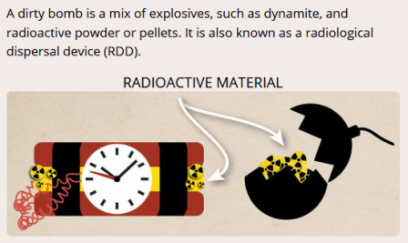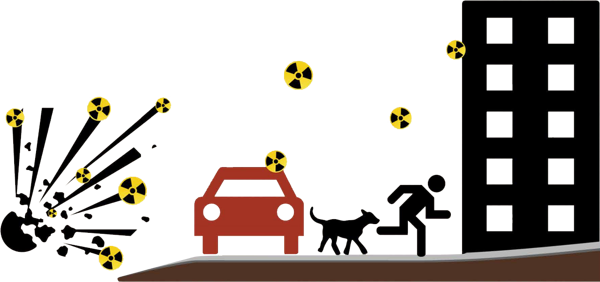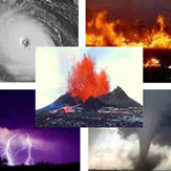Below extracted from IT'S A DISASTER! (proceeds benefit USFRA - Learn more)

What is a “dirty bomb”?
A radiological dispersion device (RDD) - also known as a dirty bomb - uses conventional explosives (such as dynamite) to spread radioactive materials in the form of powder or pellets over a targeted area.
A terrorist’s main reasons for using a “dirty bomb” is to cause damage to buildings, contaminate an area, and spread fear or panic.
This type of attack appeals to terrorists since it doesn’t require a lot of technical know-how to build and use ... plus low-level radioactive materials are pretty easy to obtain since they are used in many fields like agriculture, research and medicine. The most harmful, high-level radioactive materials would be found in nuclear power plants and at nuclear weapons sites so could be difficult to obtain and handle.
What are the dangers of an RDD (“dirty bomb”)?
According to the CDC, the primary danger from a dirty bomb would be the blast itself - not necessarily the radiation. Knowing how much (if any) radiation might be present at the attack site is difficult when the source of the radiation is unknown until site is tested. However, since many RDDs use low-level radioactive materials, there probably would not be enough radiation to cause severe illness.
Has anyone used a “dirty bomb” before?
According to a United Nations report, Iraq tested a dirty bomb device in 1987 but found the radiation levels were too low to cause significant damage. Thus, Iraq abandoned any further use of the device.
BEFORE A RADIOLOGICAL THREAT OR EVENT:
Make a plan – Determine safe spots in your home in case you need to shelter-in-place and decide where family members should meet if separated when disaster strikes. Know where kits are located and practice drills. Check emergency plans for schools, day care and nursing home to learn where everyone goes if evacuated. Find out if there are any below ground shelters near your home, school or office in case you need to take cover from radiation.
Report strange things - Be aware of your surroundings -- watch for strange or suspicious packages, abandoned briefcases or backpacks and report suspicious activities to local authorities.
Stay current on threats - DHS posts alerts and news about national security online and listen to local and national news.
Be ready to evacuate - Listen to authorities -- if told to leave - DO it!
DURING A RADIOLOGICAL EVENT OR EXPLOSION:
Don’t panic... - Stay calm and don’t stop to retrieve personal items or make phone calls - get to a safe place.
Don’t look... - Do not look directly at explosion, flash, blast or fireball!
Things to watch out for:
- falling objects - if things are falling off bookshelves or from ceiling get under a sturdy table or desk
-
flying debris - many blast injuries are caused by flying glass, metal and other materials fires - stay below the smoke (crawl or walk like a duck)
- only use the stairs (don’t use elevators)
- check doors with back of hand before opening (If HOT, do NOT open - find another exit!) - weak structures - be careful since floors, stairs, roofs or walls might be weakened by the blast

IF INDOORS - Stay put if building is not damaged but leave if warned of a radiation release inside. Cover nose and mouth and find shelter in a building not damaged by blast and prepare to shelter-in-place.
IF OUTDOORS - Cover mouth and nose with a cloth or handkerchief and take shelter in a safe building as quickly as possible!
IF IN A VEHICLE - Keep windows up, close vents, use “recirculating” air and keep listening to radio for updates. If possible, drive away from site.
AFTER A RADIOLOGICAL EVENT OR EXPLOSION:
If you are trapped in an area:
- light - use a flashlight – never use matches or lighters in case there are gas leaks
- be still - try to stay still so you won’t kick up dust
- breathing - cover your mouth with a piece of clothing
- make noise - tap on a pipe or wall so rescuers can hear you (shouting may cause you to inhale a lot of dust)
Rescuing others - Untrained persons should not try to rescue people who are inside a collapsed building… wait for emergency personnel to arrive – then, if they need you, they will ask.
Avoid crowds - Be aware large crowds may be targeted for a second attack.
Reduce exposure - Get out of area quickly and into nearest building to reduce chances of being exposed to radioactive materials (or chemicals). The less time you spend in a potentially contaminated area the better.
If radioactive materials were possibly present:
Don’t panic -- Listen - Stay calm and listen to radio, TV and officials to ...
- Determine if your area is in danger or contaminated.
- Find out where to go for radiation monitoring and blood tests to determine if you were exposed and what to do to protect your health if radioactive materials are found.
- Learn if KI (potassium iodide) is being passed out by authorities and, if so, find out where to get it. Or ask if you should take KI if in your Disaster Supplies Kit. Dirty bombs don’t normally have radioactive iodide so KI may not be needed.
As long as you are NOT told to evacuate:
- Stay put – Stay inside and prepare to shelter-in-place!
- Close doors, windows, vents and fireplace damper.
- Turn off air conditioner, ventilation fans, furnace and other intakes (they pull in air from outside).
- Grab Disaster Supplies Kit and go to a basement or underground area (if possible).
- Keep a battery-operated radio with you to hear updates.
- Stay inside until authorities tell you it is safe to go out!
Clean up - If you were possibly exposed to radiation (or chemicals)...
- store clothes & shoes - put clothing and shoes in tightly sealed containers or plastic bags and ask health officials what to do with them
- shower - wash body and hair to remove particles / toxins
Will I get radiation sickness or cancer...? - Just because you were at the site of a dirty bomb does not mean you were exposed to radioactive materials. Radiation cannot be seen, smelled, felt, or tasted. Until doctors are able to check skin with sensitive detection devices or run blood tests to determine there was any radiation - no one really knows if they were exposed (unless you have your own detection devices!) And, even if you were exposed to small amounts of radioactive material, it does not mean you’ll be sick or get cancer. Stay calm -- listen to and work with medical health professionals since it depends on each situation or incident.
Source: IT'S A DISASTER! ...and what are YOU gonna do about it?
Images: CDC


